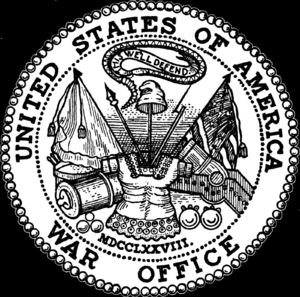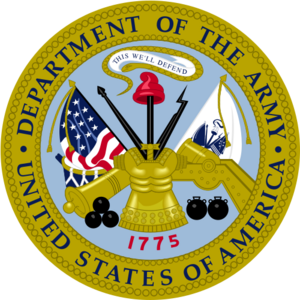United States Department of War facts for kids
The United States Department of War was an important part of the United States government. It was also known as the War Office. This department was in charge of the country's land forces, like the army. Later, it also looked after air forces.
The Department of War started in 1789. It worked until September 18, 1947. After that, it became part of a new group called the National Military Establishment. This group was later renamed the Department of Defense on August 10, 1949.
Before 1798, the War Department also managed the country's navy. But in 1798, a separate department, the Navy Department, was created just for naval affairs.
Contents
What Was the Department of War?
The Department of War was a main part of the U.S. federal government. It was part of the executive branch. This branch helps carry out the laws of the country.
Its main job was to manage and support the military forces on land. This included making sure soldiers had what they needed. It also made sure the army was ready for action.
From War Department to Department of Defense
For many years, the Department of War was responsible for the army. But after World War II, the government decided to make changes. They wanted a more unified military structure.
So, in 1947, the Department of War was replaced. It became part of the National Military Establishment. This new organization brought together the army, navy, and the new air force. In 1949, this group was renamed the Department of Defense. Today, the Department of Defense is still in charge of all U.S. military branches.
When the United States was a young nation, it needed a navy to protect its coasts and trade. Before 1798, the Department of War handled naval matters. This meant it was responsible for both the army and the small navy.
However, as the country grew, the navy's importance increased. It became clear that naval affairs needed their own dedicated department. So, the Navy Department was created in 1798. This allowed the Department of War to focus entirely on land forces.
Images for kids
See also
 | Selma Burke |
 | Pauline Powell Burns |
 | Frederick J. Brown |
 | Robert Blackburn |





